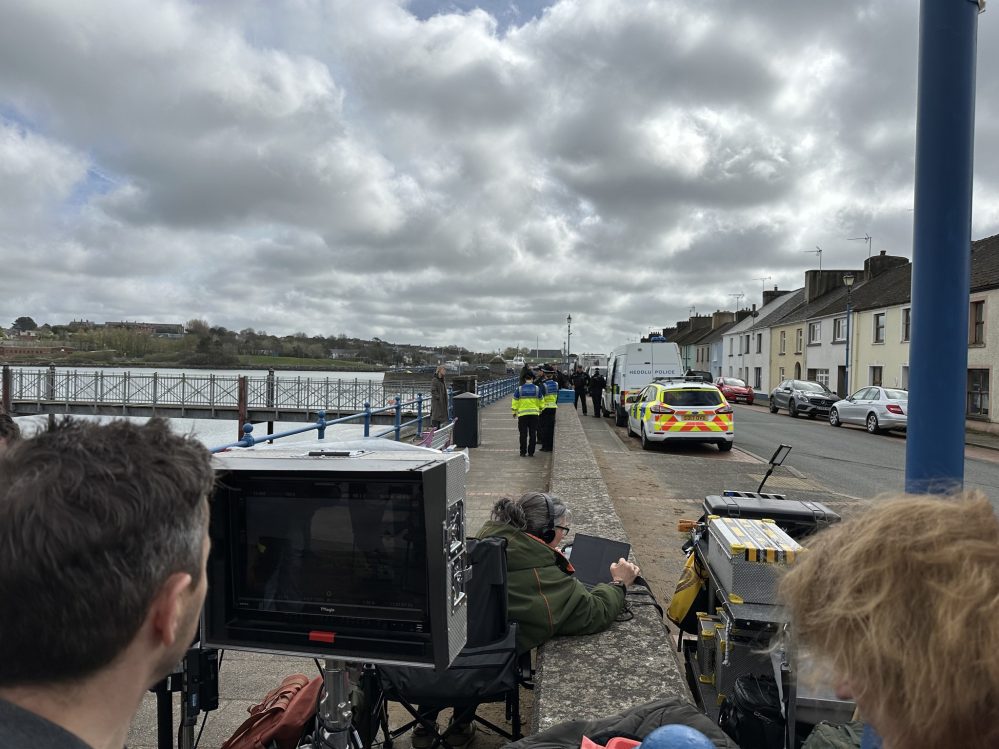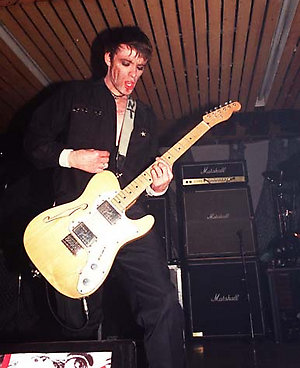Entertainment
New Welsh crime drama ‘Cleddau’ wraps filming in Pembrokeshire

AFTER a year of filming, the much-anticipated Welsh crime drama Cleddau/The One That Got Away has wrapped production in the picturesque town of Pembroke Dock, Pembrokeshire. This six-part series, slated to premiere on S4C later this year, has captured attention not only for its compelling narrative but also for its deep ties to the Welsh landscape and culture. The drama, named after the River Cleddau that runs through Pembrokeshire, is set against the stunning yet rugged coastal backdrop of West Wales, which plays a significant role in shaping the atmosphere and tension of the story.
The plot centers around the shocking murder of a nurse in Pembroke Dock, a crime that reverberates through the small community, reopening old wounds and casting doubt on a long-standing conviction. As the investigation unfolds, the possibility of a copycat killer emerges, adding layers of complexity and suspense to the narrative. The series follows DI Ffion Lloyd, played by Elen Rhys, and DS Rick Walters, portrayed by Richard Harrington, as they navigate both the professional challenges of the case and the personal tensions that arise from their past relationship as former lovers. This dual focus on the crime and the emotional dynamics between the characters promises to keep viewers on the edge of their seats.
The series boasts an impressive Welsh cast, including Rhian Blythe, known for her work in Y Golau and Craith/Hidden. The drama is penned by Catherine Tregenna, a celebrated Welsh writer with a distinguished career that includes work on The Bench, Law & Order UK, Lewis, and DCI Banks. Tregenna’s return to Welsh television is particularly noteworthy as she brings over 25 years of experience in crime drama, crafting a story that is as emotionally resonant as it is suspenseful.
Directed by Carmarthenshire-born Sion Ifan, who helmed all six episodes, the series promises to deliver a visually stunning and emotionally powerful viewing experience. Ifan’s direction is expected to capture the stark beauty of the Welsh landscape, which serves as more than just a backdrop but an integral part of the story’s atmosphere. The production has been supported by Creative Wales, underlining its cultural significance and the importance of Welsh-language content in the global market.
Produced by Blacklight Television in collaboration with Banijay Rights, the series is set to reach a global audience, with an English-language version being made available for international viewers. This dual-language approach reflects the growing international interest in Welsh noir and the broader trend of Welsh-language productions gaining recognition beyond Wales. The production team, including executive producers Phil Trethowan and Ben Bickerton, has expressed excitement about the series, highlighting its ability to keep audiences guessing until the final moments.
The involvement of Banijay Rights in the distribution underscores the series’ potential impact on the global stage, with industry leaders praising the show’s intricate storytelling and the evocative use of the Welsh landscape. As anticipation builds for its release, Cleddau/The One That Got Away is poised to be a landmark series for S4C and a significant contribution to the genre of crime drama, showcasing the strength of Welsh storytelling and the growing influence of Welsh-language television productions worldwide.
This drama, rich in both narrative depth and cultural significance, is more than just a crime thriller; it represents a milestone in Welsh television, with its blend of compelling characters, tense storytelling, and stunning visuals making it one of the most eagerly awaited series of the year. As viewers prepare for its release, Cleddau/The One That Got Away is set to captivate audiences both in Wales and around the world, marking a new chapter in the rise of Welsh noir on the global stage.
(Cover Image: Sam Kurtz/Facebook)
Entertainment
New appeal in search for missing Manic Street Preachers musician

Family and charity issue fresh appeal for information about guitarist 31 years on
THIRTY-ONE years after the disappearance of Richey Edwards, a new public appeal has been issued urging anyone with information to come forward.
Edwards, guitarist and lyricist with Manic Street Preachers, vanished on January 31, 1995, in a case that has become one of the most enduring mysteries in British music history.

The then 27-year-old was last seen at the Embassy Hotel Bayswater in west London, where he had been staying ahead of a promotional trip to the United States. He checked out of room 561 but never reached his destination.
Despite numerous reported sightings over the years, none have ever been confirmed. Edwards was officially declared presumed dead in 2008, though his family continue to mark the anniversary of his disappearance and keep hope alive that answers may still emerge.
Anniversary appeal
The charity Missing People has released a statement in collaboration with Edwards’ sister Rachel, asking the public to remember the case.
In a social media post, the organisation said: “It is 31 years since Richard went missing, please keep his family in your thoughts.”
They also repeated key identifying details from the time he vanished. Edwards was described as white, around 5ft 7in tall, slim, with brown eyes and a shaved head. He had several distinctive tattoos, including a rose with the words ‘Useless Generation’, the phrase ‘I’ll surf this beach’, and a scar on his lower left arm where he had scratched the words ‘4 REAL’.
Unanswered questions
His car was later found near the Severn Bridge services, close to the Welsh border, prompting widespread searches but yielding no firm clues about what happened next.
At the time of his disappearance, the band were on the brink of international success. Edwards’ intense, literate songwriting and striking image had already made him a defining figure in Welsh rock music. More than three decades later, fans still hold vigils, create murals and share tributes across Wales and beyond.
Police say the case remains open.
Anyone with information is asked to contact the Metropolitan Police Service on 101 or use their online reporting service, quoting reference CONNECT REF 01/764429/24. Missing People also operates a free, confidential helpline on 116 000.
Entertainment
Turner and Constable brought to life on the big screen at the Torch Theatre

ART lovers in Pembrokeshire will have the chance to experience the lives and rivalries of two of Britain’s greatest painters when a new documentary, EOS: Turner & Constable, arrives at the Torch Theatre this March.
Celebrating the 250th anniversary of their births, the film explores the intertwined stories and enduring legacies of J.M.W. Turner and John Constable alongside Tate Britain’s major new exhibition. Exhibition on Screen has been granted exclusive behind-the-scenes access, bringing their extraordinary art and personal histories vividly to the cinema screen.
Born just a year apart, Turner and Constable helped redefine landscape painting in Britain – and were fierce competitors. Both captured a nation in transition, yet their styles could not have been more different. Turner’s dramatic skies, blazing sunsets and atmospheric scenes from his travels contrasted sharply with Constable’s gentle, nostalgic portrayals of the English countryside and familiar rural life.
Their opposing visions divided critics and audiences alike, famously described at the time as a clash of “fire and water”.
The documentary offers rare, intimate access to sketchbooks, letters and personal artefacts, alongside insights from leading curators and art historians. It also ties in with Tate Britain’s landmark exhibition, running in London from November 2025 to April 2026, which reunites the two masters’ works side-by-side.
This cinematic event gives audiences the chance to see their masterpieces in stunning detail and discover unexpected sides to two artists whose rivalry shaped British art history.
Turner and Constable will be screened at the Torch Theatre on Sunday, March 15 at 4:30pm.
Tickets are £13. For bookings, visit www.torchtheatre.co.uk or call the Box Office on 01646 695267.
Entertainment
Companies awarded funding as part of Made in Wales: Factual Entertainment project

BBC Cymru Wales, BBC Network and Creative Wales have awarded four Wales-based production companies funding to develop ideas for a new Factual Entertainment series
BBC CYMRU WALES, BBC Network, and Creative Wales announced the launch of a new development fund for a Factual Entertainment series at the Wales Media Summit last year.
Production companies with a substantive base in Wales were invited to pitch bold, original ideas that celebrate Welsh creativity while delivering unforgettable entertainment to audiences across the UK.
Boom, Curve Media, South Shore and Tŷ’r Ddraig have successfully been awarded funding to further develop their ideas for a new Factual Entertainment series. Each company will receive £10,000 of funding, with development starting in the coming weeks.
Nick Andrews, Head of Commissioning BBC Cymru Wales, said: “We were really impressed by the variety and volume of the submissions we received – companies really responded to our call for ideas for an ambitious, returnable format, that surprises, unites, and captivates. We’re so excited to be working with the four successful companies, and we’re looking forward to seeing how their ideas develop further.”
Catherine Catton, Head of Commissioning, Factual Entertainment and Events, said: “Made in Wales is a collaboration to find a major new factual entertainment series that will harness the best of Welsh creativity and resonate across the UK. We are really looking forward to working with brilliant Welsh talent to come up with the next big thing.”
Joedi Langley, Interim Head of Creative Wales, said: “This announcement follows a recently published and updated Memorandum of Understanding (MOU) between Creative Wales and BBC, a commitment between the two organisations to work together to support the vibrant, diverse, world-class screen industries in Wales.
“This new development funding will do just that – create new opportunities for Welsh based production companies to develop exciting, original ideas for factual content. Congratulations to the indies, we look forward to seeing what comes next!”
The total funding of £40,000 has been provided by BBC Cymru Wales, BBC Network and the Welsh Government via Creative Wales.
-

 Health4 days ago
Health4 days agoConsultation reveals lack of public trust in health board
-

 News5 days ago
News5 days agoCaldey still unsafe, survivors warn — despite Abbey’s reform claims
-

 Community5 days ago
Community5 days agoPembrokeshire students speak at national Holocaust Memorial Day event
-

 Local Government7 days ago
Local Government7 days agoTribunal over former Neyland councillor’s conduct adjourned
-

 Entertainment6 days ago
Entertainment6 days agoRapunzel brings festive magic to Torch Theatre
-

 News5 days ago
News5 days agoKurtz raises Gumfreston flooding in the Senedd as petition deadline nears
-

 Crime6 days ago
Crime6 days agoMan denies murdering brother as jury hears of ‘ferocious attack’ at Morriston flat
-

 Education5 days ago
Education5 days agoAttendance concerns at Milford School reflect wider issue raised at the Senedd































